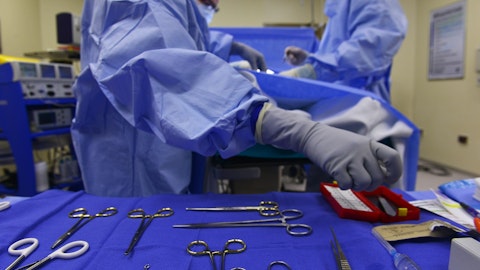Wayne DeVeydt: So as we called out, we called out total joints this quarter, growing up 84% in our ASCs. We clearly see orthopedics being a strong grower. But to be honest with you, all specialties were up and so consistent with our expectations, we’re seeing our core service lines show strength and continued market share gains. So I think across the board, it was quite good, but I would definitely note, and you can see it in our — obviously, our same per case, our per case revenue increases, same facility that we had pretty strong acuity growth, particularly at MSK.
Operator: Our next question is from Brian Tanquilut with Jefferies. Please proceed with your question.
Brian Tanquilut: Good afternoon, guys and congrats. I guess, Wayne, obviously, congrats on the Intermountain deal. As I think about the surgery part of your strategy, historically, this was a two-way approach to running surgery centers, right? And now obviously, you have a big partnership with the marquee hospital name. So maybe a couple of things. Just thinking about the strategy, I don’t want to say shift but expansion there, like how you’re thinking about that? And maybe if you can remind us what the advantage is of partnering with the hospital as well versus your legacy two-way model?
Wayne DeVeydt: So let me just start off by saying that one of the things that Eric brought when he came in and then took over as CEO was this idea that we really thought we could make the algorithm even more additive if we would be open to some of these three-way JV partnerships. And the core to that was, will they be like-minded similar to what the way we see the world and who we want to align with and how we want to align. So first and foremost, super excited because this is now another growth lever for us. I’m going to ask Eric to comment though, since this was a big part of his brainchild as we were thinking about the strategy of where we wanted to take this over time. And more importantly, maybe use Intermountain as an example of how this like-mindedness works.
Eric Evans: Yes, Brian, first of all, thanks for the kind words. We were excited about the quarter and excited about the start of the year, the Intermountain partnership and the OhioHealth partnership, both are quite exciting for us. Obviously, two really well thought of systems. You keen it on Intermountain. One thing that makes that partnership so aligned with the way we see the world is Intermountain also has a large payer arm. And when you have a payer arm like that, they see the world from a highest value, highest use case as well. And so we naturally align with their thinking on how they want to move in the world and really help this transition to higher-value cases. Clearly, they have choices when they choose a partner.
We feel like we bring best-in-class operational capabilities, the ability to grow their facilities. And so we’re excited initially starting with helping them manage their already kind of strong position in the State of Utah, but more importantly, investing together to grow across the Mountain West. So as Wayne mentioned, this is additive to our growth algorithm. We’re going to continue to be a very strong two-way partnership company as we always have been. But these three-way partnerships, we do think expedite our ability to grow in certain markets where we have not been as quick to grow. And they also, we think, unlock a lot of potential to continue the acuity increases in those regions. So super excited about it, Intermountain, again, like-minded in the way that what they really believe is they want to deliver the best quality, lowest cost, high-value procedures and care in general to their patients, and we’re a natural partner when that’s their mission.




